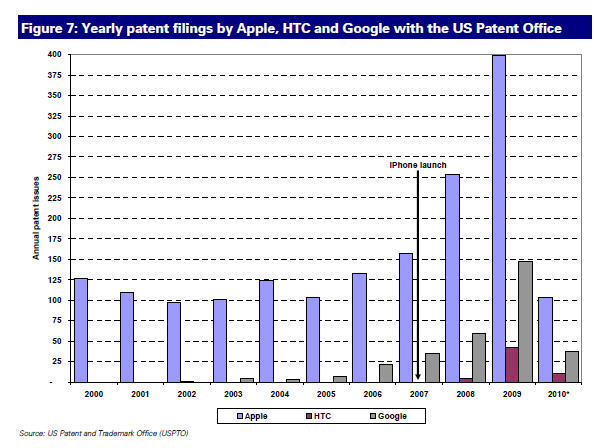Apple's HTC lawsuit pays off: Rival roadmaps disrupted

Apple's high-profile patent lawsuit against HTC is already delivering returns since it is "meaningfully disrupting the development roadmaps for would-be iPhone killers," according to an Oppenheimer analyst.
Oppenheimer's Yair Reiner pens an interesting tale of the behind-the-scenes look at Apple's effort to defend its intellectual property and then launching the HTC suit. Reiner's tale is based on "industry checks" and has garnered a good amount of buzz.
Starting in January, Reiner contends that Apple "launched a series of C-Level discussions with tier-1 handset makers to underscore its growing displeasure at seeing its iPhone-related IP infringed." The HTC lawsuit was a "lawyered-up exclamation point on a series of blunt conversations that have been occurring behind closed doors."
More: Apple's HTC lawsuit: Is it biting off more than it can sue? · HTC responds to Apple; What's the long-term hit? · How much will Apple's suit against HTC affect Android's momentum? [podcast] · Apple's HTC patent suit: Can it derail Google's Android devices?
Reiner picks up with the January launch of the Motorola Droid and HTC Eris. He writes in a research note:
Top-tier handset makers continued to avoid implementing multi-touch, but Apple could safely assume that they were hanging back to gauge Apple's response to Motorola and HTC. If there wasn't one, the OEMs would likely read the silence as a green light, especially after Google also moved to enable multi-touch on its Nexus One phone.
It was likely in order to counter that perception that Apple began reaching out to handset OEMs in January and explaining in no uncertain terms that it was now ready to do battle--and not just on multi-touch. It was ready to press its case along a number of axes that had made the iPhone experience unique, from the interpretation of touch gestures, to object-oriented OS design, to the nuts and bolts of how hardware elements were built and configured.
The message has been received loud and clear. According to Reiner, rival hardware and software teams are on the hunt for work arounds. Meanwhile, lawyers are ramping up responses. All of this results into hedged roadmaps that aren't going to move at the speed of light. With slower development and gun-shy handset makers iPhone has a much better business model moat. Simply put, Apple's return on its HTC lawsuit has already been delivered. The company took these patents (courtesy of Deutsche Bank).
And froze a market. Not bad for a few months work.
Among the key points from Reiner.
- Apple's reaching out to rival handset manufacturers has created an oil slick. Reiner notes:
Until recently, most high-end smartphone programs were focused primarily on trying to match the iPhone's user experience, and secondarily on avoiding any egregious violations of Apple's patents.
We believe this order of priorities has temporarily changed--along with the industry's appreciation for how far Apple is willing to extend the fight. Few OEMs believe that simply staying clear of multi-touch can, on its own, avert Apple's wrath. We believe a lot of software and hardware is being sent back to engineering departments for work-arounds.
- These handset makers are casting doubt on Google, which already suffered from wireless industry misgivings. Simply put, Google just isn't trusted, but is seen as a necessary evil.
Apple's proxy war against HTC is helping to stoke mounting concerns about the strategic danger for handset OEMs of relying too heavily on the Android operating system. In order to mitigate risk, we believe handset OEMs that can afford to support multiple platforms will do so.
- Microsoft's Windows Phone 7 software is emerging as a viable partner and alternative to Android. Why? Microsoft has said it will join any intellectual property battle and has the patents to back it up.
Reiner:
Part of Win7's appeal is its capability as an OS. No less important, however, is its strategic value as a hedge against the risk of Android's becoming too strong--or proving too weak. Our checks indicate that Microsoft has been quick to sniff out this burgeoning opportunity and has begun to aggressively promote the strength of its own IP portfolio, as well as its willingness to join battle with customers that come under IP attack.
- Apple's legal moves "potentially brings Apple a step closer to a head-on legal confrontation with an array of gargantuan adversaries. Now that it has made its point, Apple may want to go back to saber rattling."
